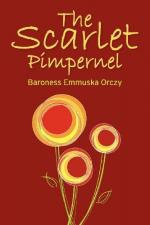“He has been like this the best part of the day,” Hebert said with a shrug of the shoulders. “We put his bread and water right under his nose. He ate and he drank, and I suppose he slept. But except for a good deal of swearing, he has not spoken to any of us.”
He had followed his chief into the cell, and now stood beside the palliasse, holding a small dark lantern in his hand. At a sign from Chauvelin he flashed the light upon the prisoner’s averted head.
Mole cursed for awhile, and muttered something about “good patriots” and about “retribution.” Then, worried by the light, he turned slowly round, and with fish-like, bleary eyes looked upon his visitor.
The words of stinging irony and triumphant sarcasm, all fully prepared, froze on Chauvelin’s lips. He gazed upon the prisoner, and a weird sense of something unfathomable and mysterious came over him as he gazed. He himself could not have defined that feeling: the very next moment he was prepared to ridicule his own cowardice—yes, cowardice! because for a second or two he had felt positively afraid.
Afraid of what, forsooth? The man who crouched here in the cell was his arch-enemy, the Scarlet Pimpernel—the man whom he hated most bitterly in all the world, the man whose death he desired more than that of any other living creature. He had been apprehended by the very side of the murdered man whose confidence he had all but gained. He himself (Chauvelin) had at that fateful moment looked into the factitious Mole’s eyes, had seen the mockery in them, the lazy insouciance which was the chief attribute of Sir Percy Blakeney. He had heard a faint echo of that inane laugh which grated upon his nerves. Hebert had then laid hands upon this very same man; agents of the Surete had barred every ingress and egress to the house, had conducted their prisoner straightway to the depot and thence to the Abbaye, had since that moment guarded him on sight, by day and by night. Hebert and the other men as well as the chief warder, all swore to that!
No, no! There could be no doubt! There was no doubt! The days of magic were over! A man could not assume a personality other than his own; he could not fly out of that personality like a bird out of its cage. There on the palliasse in the miserable cell were the same long limbs, the broad shoulders, the grimy face with the three days’ growth of stubbly beard—the whole wretched personality of Paul Mole, in fact, which hid the exquisite one of Sir Percy Blakeney, Bart. And yet! ...
A cold sweat ran down Chauvelin’s spine as he gazed, mute and immovable, into those fish-like, bleary eyes, which were not—no! they were not those of the real Scarlet Pimpernel.
The whole situation became dreamlike, almost absurd. Chauvelin was not the man for such a mock-heroic, melodramatic situation. Commonsense, reason, his own cool powers of deliberation, would soon reassert themselves. But for the moment he was dazed. He had worked too hard, no doubt; had yielded too much to excitement, to triumph, and to hate. He turned to Hebert, who was standing stolidly by, gave him a few curt orders in a clear and well-pitched voice. Then he walked out of the cell, without bestowing another look on the prisoner.




